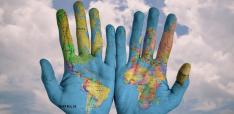Plato to NATO: The Case of Our Strange Myopia

Drawing on growing evidence of our cooperative natures, Hakan Altinay argues that the Plato-to-NATO meta-narrative common to Western social science is too narrow to capture what makes us survive and thrive.
There are some curious signs in the air. In the United States, presidential hopeful Hilary Clinton talks about the need for kindness. (1) She was explicit about how odd that felt as a presidential candidate; after all, her husband’s presidential campaign had branded as stupid everyone who did not get the singular centrality of the economy. There was a similar feeling of being outside one’s element when Foreign Policy heavy weights had to come to terms with notions such as love and compassion rather than their usual concepts such as force deployment and power projection in making sense of how the world changes. The editors of the New York Times must have been similarly thrown off keel when a relatively obscure commencement speech advising people to err in the direction of kindness got a million downloads.
So, what is going on? Are we discovering that our default assumptions and standard narratives about human nature need an overhaul or a rethink? A few years ago, Marshall Sahlins did pose a colossal challenge, and argued that the Western civilization was based on an erroneous conception of human nature. He pointed out that a conception of humanity suffering from avarice, which could only been reigned through extraordinary measures, was the basis of Western civilization. Sahlins further argued that this key notion was not shared by other civilizations in the world. He concluded that the Western civilization was constructed on an exceptional, mistaken, and almost perverse idea of human nature, and added “Sorry, beg your pardon; it was all a mistake.…(T)his perverse idea of human nature endangers our existence”. (2)
If not a full blown illusion, I would argue that there is a myopia in our storyline about ourselves. Storylines do matter. They provide us with a progression which we take to be natural. Storylines frame, while seamlessly delineating normal and abnormal. They also provide us with a place in that progression and therefore an identity. The storyline of the many core “From Plato to NATO” university courses has such consequential qualities. Because these courses were such cardinal features of the university experience for decades, their storyline is very much the secular canon for the current generation of decision makers.
That secular canon suffers from an undiagnosed myopia. In starting with Plato, our initial puzzle becomes the trial and death of Socrates. We have to wrap our minds around how this wise man could be shunned and sentenced to death by his contemporaries. The tentative lesson we draw is that people are capable of unwise acts and can easily succumb to passions. We are nudged to salute Machiavelli for impressing on us that politics was never intended to be about morality; it is an amoral practice of managing vices and saving us from ourselves. Hobbes tells us that man is a wolf to other man, and has to be reined in by submitting to a bigger beast, the Leviathan. Adam Smith advises us to rely on the self-interest, and not charity, of the butcher and the grocer to secure our meals and overall welfare. Charles Darwin helps us shed any remaining illusions by pointing out that survival of the fittest has always been the most basic rule in nature. These courses often end with a discussion of 20th totalitarianism. Both in the case of Nazism and Communism, we trace similar failings: societies not possessing prudential temperaments and succumbing to unwise fantasies. Popper provides us with the finishing touches: We have tried everything. The sensible thing to do is to avoid ambitious aspirations, and manage our affairs in a post-aspirational mode. We should not seek big truths, and merely avoid big mistakes.
If students harbour any diverging hunches, the faculty is not without recourse. If, for example, a student wonders whether there are no reservoirs of wisdom outside the chronicled Western path, she is ridiculed and challenged to consider the practice of sati where widows are expected to perish with their deceased husbands. Is that what she has in mind for sources of non-Western wisdom? If the professor gets any push back about the possibility of bottom-up cooperation without a leviathan, students are told about the 1971 Zimbardo experiment; they have no option but conclude that ordinary people are capable of remarkable evil, not beneficence. The moral of the story is clear: we need to opt for prudence, even if it is at the expense of aspiration. We ought to be alert, and work on our indignation reflexes and muscles, not those of curiosity, because the next mortal blow to civilization is never more than one slip-up away.
This storyline is myopic because it fails to account for large chunks of human affairs. George Saunders’ favorite temperament, kindness, finds no place in this narrative. Cooperation is equally nonexistent, and trust is a folly. Yet, by any account we rely on extraordinary amount of trust and benign cooperation at each turn of our daily lives. Consider the ultimatum game: This is a game where a person is given $100, and is told to offer a split to a second person. It is called the ultimatum game because the second person has no say on what the split is, and receives, in effect, an ultimatum. The two options available to her are to accept the split, or reject the split, in which case neither of them get anything. If we were all convinced of each others’ beastly nature, we would expect the most common split to be $99 for the first person and $1 for the second person. The first person would be foolish to offer anything more than $1, as she is expected to do nothing other than maximize her gain, and the second person would be foolish to turn down $1, as that is better than what he had a minute ago. Yet, 30 years of conducting this experiment in all corners of the world reveals that this is not at all what we do. The average split that the people offer is 55-45; it is not quite 50-50, but close enough. What is more revealing is that splits worse that 75-25 are routinely rejected by people in the second position, a thoroughly irrational move, if maximizing our self-interest is indeed the only metric we have. It seems that many among us are ready to pay a personal price to oppose gross unfairness.
In these experiments, people are not told the players are related, or somehow are part of the same community; neither are they told that their performance at the game will become public knowledge and a part of their reputation. People are not primed, in other words, to defend fairness because they will benefit from a fair system or a good personal reputation in the long run. We seem to innately understand the importance of fairness without being primed or lectured about it.
There is another variant of this experiment, where again $100 is given to a person who is told to split it with a second person, but this time around the second person has no right to turn it down, and therefore no veto. In this version, called the Dictator Game, the average split is 70-30, and a quarter of the people give the second person $50 or more, even though there is no immediate material punishment to a 100-0 split. So, what is going on? Could it be that we are not selfish brutes after all? Could Sahlins be right after all?
We are puzzled by widespread commitment to fairness, partly because the Plato-to-NATO storyline allows not for such temperaments. The storyline quarrels with overly rosy notions of human nature, but it makes no effort to calibrate overly pessimistic accounts. We are left believing in the survival of the fittest, even as evolutionary biologists such as Edward Wilson call attention to how solidaric groups, and not just selfish individuals, have an evolutionary advantage. Ours, it seems, is a dynamic system where we both cooperate and compete. Yet, if our cognitive radars cannot be attuned to pick up on cooperation, we never proceed to the real and interesting question of how the tension between cooperation and competition is governed over time. In his new and celebrated book, Sapiens, Yovel Harari argues that our ability to cooperate with large numbers of other humans and in varied and flexible modes is what explains our position in the food chain. We are not the strongest, or fastest, but we nevertheless dominate the planet because we cooperate the best. Harari asks us to compare what would happen if we leave a human being and an ape in island, and return back in a month; his conjecture is that we would find a miserable human and a jolly ape. Yet, if we repeat the same experiment with a thousand humans and thousand apes in the same island, we would find a thousand humans self-organizing into an effective body politic and in all likelihood, caging the apes. Michael Tomasello shares Harari’s thesis, and argues that humans are exceptionally equipped to think, learn, and act cooperatively. (3) Tomasello finds consistent manifestation of this uniquely human trait as early as in 18-month-old toddlers. He argues that we achieve joint intentionality through language. Joseph Henrich argues that our success is a function of our collective intelligence; that we are born into the formidable cumulative know-how of all the previous generations; and, that is why we lead highly productive lives. (4) Henrich notes that we do not have this know-how because our species is smart, but rather that we are smart because we have evolved to build a cumulative culture with an extraordinary repertoire of tools, concepts, skills, and heuristics. Sadly, none of these theses find any space in the Plato-to-NATO meta-narrative.
Non-Western frameworks and voices seem more attuned to what Harari, Tomasello and Henrich describe: Desmond Tutu pities the “I think, therefore I am” formulation, and argues that the wiser definition would need to be “I am because you are.” (5) According to Ubuntu, any notion which denies humans’ social and physical interdependence, is a recipe for destitution. Confucius is said to have advised giving up even security and food, but never civic trust, as that would be the basis of rebuilding any society. Dalai Lama depicts religion as tea, and kindness as water; one can live without tea, but kindness is as essential to our survival as water and our cultures and social set-ups will need to be judged on how well they nurture and sustain kindness. Even Islam has multiple modes and precepts to strength civic solidarity. In Turkish, the term for law and rapport are identical, probably reminiscent of an age where law was organically developed and did not only originate from the sovereign. It was among the Turkish fisherman that Elinor Ostrom identified practices which overcame the tragedy of the commons; refuted a widely held theory; and, won her the Nobel Prize along the way.
If Confucius, Harari, Ostrom, Tomasello, Tutu et al are right, then Plato-to-NATO meta-narrative is too painfully narrow to capture what makes us survive and thrive. Kennedy is meant to have said about GDP that it includes everything except what makes life worth living. Our metanarrative about ourselves seems similarly blind to the sources of our grace and strength. It needs urgently to be calibrated.
One almost needs an archeological tenacity to find commensurate sensibilities in the Western trajectory. Take Benjamin Franklin. We now view the United States Founding Fathers as prudential thinkers deeply concerned about man’s malign potential, but one of their key contemporaries, Ben Franklin, also understood the importance of the decency of the common man. He pioneered the lending library. When he was approached for a grant, he responded by providing the man in need not with a grant, but a loan to be repaid not to him but by lending the same sum to another in distress, and instructing him “to discharge the debt by a like operation, when he shall be able and shall meet with such another opportunity.” Franklin was the original pay-it-forward mastermind. The act speaks volumes about Franklin’s civic genius, yet fails to find any space in Walter Isaacson’s 500-page biography on Franklin. Franklin must have known about the trial of Socrates, but he also seems to have known the Greek proverb, “A society grows great when old men plant trees whose shade they know they shall never sit in.”
Or, take the French revolution. The slogan for this momentous affair was “Liberté, Egalité, Fraternité”. Yet when we do a search or a ngram of these cardinal aspirations, we discover that we are five to ten times more prolific on 'liberté' than we are on 'fraternité'. The differentials between references to The Wealth of Nations versus Theory of Moral Sentiments is more gross. Can we seriously believe that we can be this lopsided and still achieve a balanced and accurate account of how we got here?
To be sure, Sahlins is too tough on Western legacy. It is not the legacy that is defective, but our account of it is deeply wanting. After years of this one-dimensional narrative, one needs a recalibrated radar to discover how Tocqueville identified the centrality of civil society for the United States, how Putnam traced civic culture in the workings of Italy, and how Habermas discerned the makings of public opinion and public sphere in the coffee houses. We owe it to ourselves and our more thoughtful forbearers to stop rendering this legacy so unidimensional. There is, thankfully, more to us than the Plato-to-NATO narrators would have us believe, and we are showing early signs of recognizing the need and demonstrating an interest in a more nuanced meta-narrative. Let’s hope we persevere in this premonition. Story lines matter, and we need to get this one right.
Hakan Altinay is the President of the Global Civics Academy.
Photo credit: lincolnblues via Foter.com / CC BY-NC-ND
Notes
(1) Hilary Clinton interview with Charlie Rose, CBS, December 1, 2015.
(2) The Western Illusion of Human Nature, p. 112, Prickly Paradigm Press: Chicago, 2008.
(3) Why We Cooperate, p. XV-XVI, MIT Press: Boston, 2009
(4) The Secret of Our Success, p. 5, Princeton UP: Princeton, 2016.
(5) “Ubuntu” in God Is Not a Christian, Harper: NY, 2011.


